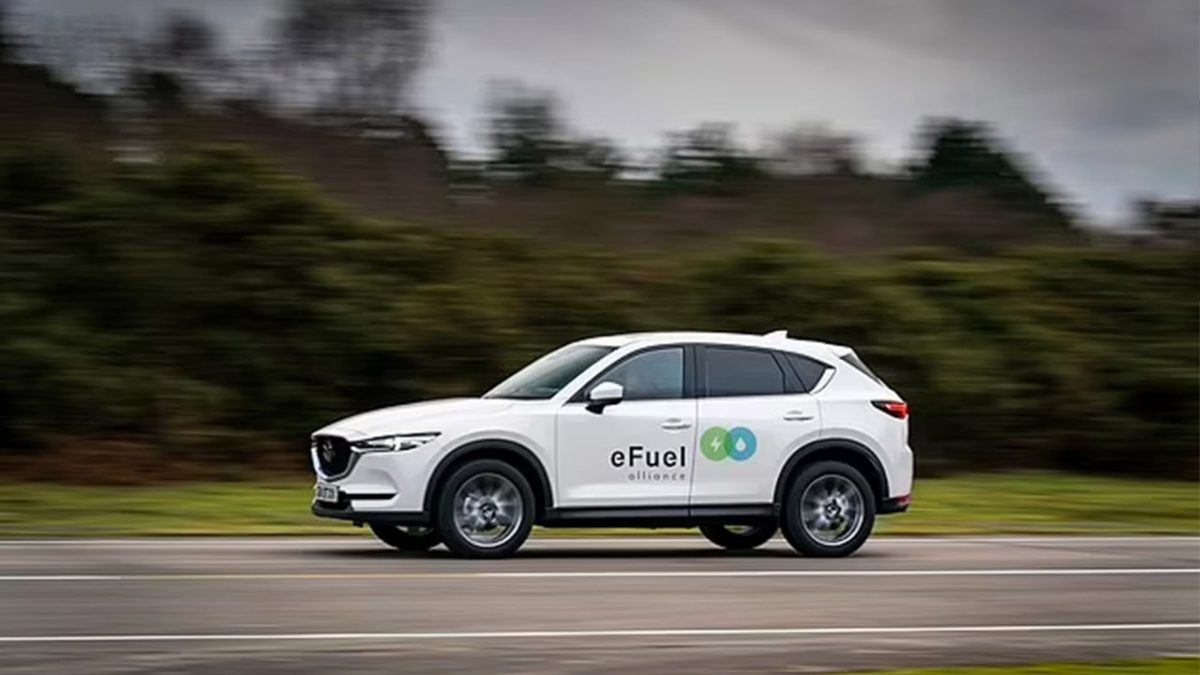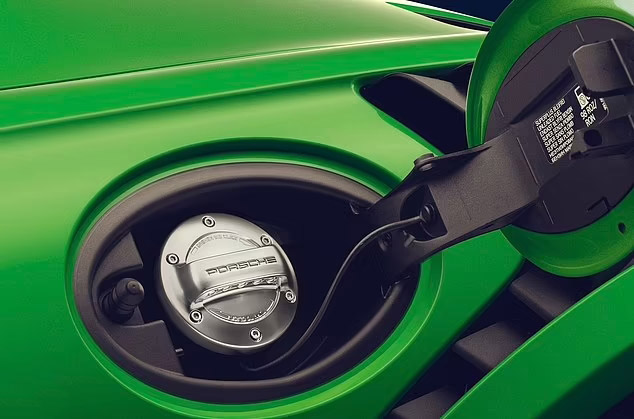If your Combustion Car Runs on E-fuel, you might be able to Keep Riding it Beyond 2035

With the EU wanting to phase our vehicles that cause pollution by 2035, you might be able to keep them if they run on e-fuel
The European Union has finally completed plans for phasing out internal combustion vans and cars that are polluting the air and heating the planet by 2035. With the document stating a 100% reduction of these vehicles, that would have meant a complete ban on manufacturing and driving them. Fortunately, a new product called e-fuel came in to save the day.

The initial meeting to finalize this glorious plan would have concluded the decision earlier this month. However, there was a sudden push to promote e-fuel that needs water, electricity, and particles from the air to make it. With this consideration in place, the EU says internal combustion engines that run on e-fuel will be exempt from the ban.
So, let’s take a closer look at how e-fuel is made and if it really is a better alternative to the current combustion engines and electric vehicles. Have you heard of direct air capture yet? You would have if you read my article on Microsoft making plans to do so with a new facility.
Basically, it takes the bad carbon dioxide from the air and stores it elsewhere. When you extract hydrogen from water, the combination of the two molecules helps make e-fuel. The one issue is that e-fuel engines will still pump some CO2 into the air, but the EU is fine with this, as the direct air capture method will just draw it back in.
NEW: Germany’s push to save the combustion engine could cost drivers over €200 to fill up a car.
Olaf Scholz’s support for e-fuel will hit motorists in the pocket while driving up emissions, oil consumption and air pollution.
? pic.twitter.com/gaB5M1hpmw— Transport & Environment (@transenv) March 23, 2023
Becoming the circle of carbon dioxide (play the Elton John song from Lion King and replace the lyrics with your own, and share it in the comments for a good time).
So, there are a few complications with the new EU decision. The e-fuel concept is relatively new, and the method of making it is going to be expensive as opposed to just charging your car’s battery. On the other end, electric cars are known to be heavier due to the battery and charging system, which is why so many manufacturers are pushing for the e-fuel application.
I mean, we’re talking about either lowering the emissions completely, or just recycling them instead. I suppose either one is better than continuing to pollute and heat the planet’s atmosphere.
Advertisement



















As an avid car enthusiast, the prospect of extending the lifespan of combustion cars through the use of e-fuels is both exciting and heartening.
One aspect that particularly intrigued me was the discussion on how e-fuels could potentially reduce the impact of carbon emissions while allowing us to continue enjoying our beloved vehicles. The article delves into the significance of adapting the car cooling system to accommodate these new fuels, highlighting the importance of technological advancements in making this transition a reality.
The idea that our existing combustion cars could be upgraded to run on e-fuels, thus extending their lifespan and reducing their environmental impact, fills me with a sense of hope for a more sustainable future. It’s incredible to think that with advancements in technology, we may be able to continue driving our trusted vehicles beyond 2035, while actively contributing to reducing carbon emissions.
Combustion vehicles will still be on the road in 2035 I guarantee you. Even today I see many who won’t even consider a EV and given how long many keep their vehicles it’s a given the combustion engine isn’t going away very soon.
By “combustion car” you mean all those e-cars, which batteries periodically explode, right?
I really hope the climate swindle a** kissing pays off. People used to pay admissions for circuses to laugh at clowns, among other things, but now you just click. There are so many clicks nowadays.
Martin, I hope you don’t censor this response; if you do, that means you’ve completely misunderstood my tone and whole informative message.
Shaun, the wording you have used is very confusing in places and certainly unscientific. The law in question was relating to enforcing a rule for new cars solid in EU from 2035 having zero emission of CO2 [2021/0197(COD)]. The linked twitter images you used are also statistically misleading.
Release of Carbon Dioxide (chemical formula CO2 and water (formula H2O) is obviously going to be a by-product of running a car on petroleum fuel because it’s a combustion process. Therefore, the proposed ruling (see above) would effectively rule out further production of combustion engines in automobiles.
One of the problems with using fossil fuel is it the dominant cause of global warming. Electrofuel carbon footprint is much smaller in contrast to traditional fossil fuel petrol.
Typically Lithium-ion battery manufacturing process is also not very environmentally friendly. Furthermore, the manufacturing of lithium-ion batteries has led to the occurrence of modern-day slavery.
What you have basically written is a “pseudoscience article” or something relating to some form of fantasy, and I have no idea why Elton John is referenced. Other than he occasionally flies around in polluting private aeroplanes.
If you want to be taken seriously or have any scientific credibility, use a different tone when trying to write about factual scientific progress. Otherwise stick with writing non-scientific articles, such as wacky crazy Social Media fads. You seem reasonable at writing airhead or fantasy content, but not so with informative science. :-/
Mr Brinkmann, this blog doesn’t seem to be supporting Subscript; those number 2 symbols I wrote are supposed to be Subscript numerals. They were correctly marked-up via HTML (when I typed them in) because they are Chemical formula – not equations. The Subscript elements (<SUB<) I wrote got completely removed by the Blog software… resulting in this following nonsense: CO2 and H2O
Let’s see what happens, if we try “Subscript Two
U+2082” as a ‘substitute’. If it works, we should get something looking half logical:Carbon dioxide (chemical formula CO₂)
Water (formula H₂O)
My last two paragraphs (in my previous post) probably don’t flow correctly and the words are just jumbled-up – they might mistakenly look hostile. What I was basically meaning; for complex scientific topics, it helps if you try to present actual (key) facts and use a more neutral tone. You can add a tiny bit humour to keep people awake. However, the target audience for some scientific articles shouldn’t be just targeted at monkeys.
I couldn’t even be bothered to “discuss the article” because it wasn’t even aimed at science fans or readers. Instead you had my critique of why I had to go trawling the internet for an obscure Law. Then point out some other random details on the subject. Because your presented facts and figures didn’t add up.
In essence the Electrofuel carbon footprint is theoretically close to net zero – it’s being used like an offset loophole.
Hmm, that “(<SUB<)" output should have actually been: "(<SUB>…</SUB>)” or it might have just been as easy for me to type:
SUBLOL.Clearly the “Subscript Two
U+2082” entered via numeric character reference functions correctly.Direct copy-and-paste input test from a word processor:
Carbon dioxide (chemical formula CO?)
Water (formula H?O)
There is a good chance this test will also work and output the subscript values.
“[…] shouldn’t be just targeted at monkeys. …”
How peculiar, that sentence was meant to imply your target audience won’t all have the intellect of a monkey – diversity.
Even if your typical audience isn’t science inclined; an article writer should have a basic understanding of the topic they are writing about in the first place. Otherwise any complex scientific based article (even for generic Ghacks readership) might as well have just been written by a chimp. Rubbish in, rubbish out.
Yes, I studied science at university; however, like I said earlier, for the initial post I just wrote disjointed “random details” on the topic without logical flow to prove a point. If the article was robust I would have possibly discussed the topic itself. ;-)
Clearly the “Subscript Two
U+2082” entered via numeric character reference functions correctly. The correctly marked-up “SUB” element via HTML (which SHOULD have worked) and “Direct copy-and-paste input test from a word processor:” both failed to render correctly (see previous test results).Carbon dioxide (chemical formula CO₂)
Water (formula H₂O)
Therefore, it can be concluded the blog is lacking in some essential HTML support functionality. Plus “Subscript Two
U+2082” as a ‘substitute’ is required in this specific case for those formula to render correctly.Testing successfully completed. 🔬
does this blog started getting mouthpiece of the EU ? Where is the windows/linux/MS/Apple news ?
Where is pure independent tech journalism?